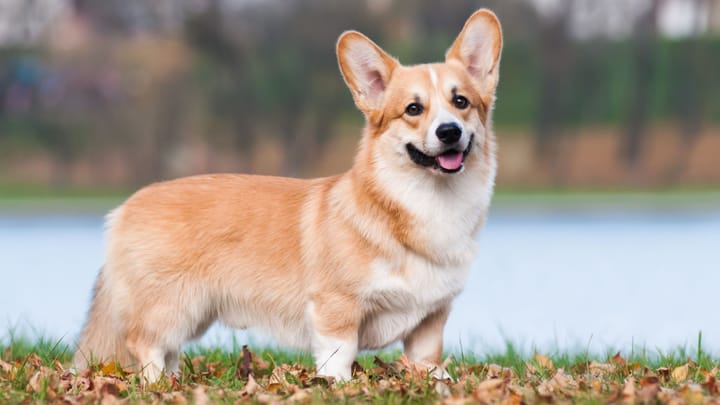Welsh Corgi


The Welsh Corgi dog has a mythical ancestry. Legends state that these gorgeous dogs were used by elves and fairies to work with their cattle, as riding creatures and to pull coaches. In more recent years, the breed has been used as a cattle herder, farm protector and of course, as a loyal companion.
|
Life expectancy |
The Welsh Corgi has a life expectancy of between 12 and 14 years |
|
Temperament |
|
|
Size |
Medium
|
|
Adult size |
Female
Between 10 and 12 in
Male
Between 10 and 12 in
|
|
Adult weight |
Female
Between 20 and 24 lb
Male
Between 22 and 26 lb
|
|
Coat colour
Cardigan: red and white, sable and white, black and white, brindle, blue merle |
Black Red Sand |
|
Type of coat
The Welsh Corgi has coat hair of medium length. This breed has a straight, harsh to the touch coat, with a dense, thick undercoat. |
Short |
|
Eye colour
Eyes of this breed are brown. |
Brown
|
|
Purchase price |
The Welsh Corgi costs between £870 and £1180 |
There are 2 types of Welsh Corgi – the Pembroke Welsh Corgi and the Cardigan Welsh. They look very similar in appearance but because they have been bred from totally different blood lines, are considered as different breeds. The most noticeable difference is the fact that the Pembroke Corgi has no tail. The Pembrokes tend to have pointed ears while the Cardigan Corgi’s ears are a rounded shape.
The Welsh Corgi is certainly a Royal dog. During her lifetime, Queen Elizabeth II owned more than 30 Corgis. Her very first Corgi was gifted to her by her father in 1933. He was given the name of Dookie, and both Princess Elizabeth, as she was at the time, and her sister, Princess Margaret, fell in love with the little dog. On her 18th birthday, the Queen received another Welsh Corgi as a gift, who she named Susan. Her love of the breed continues to this day.
More details about the Welsh Corgi
Welsh Corgi: Origins and history
Dating back many centuries to 920 AD, the Pembroke Welsh Corgi is thought to have been introduced into Wales by Flemish Weavers. They utilised these small dogs to drive their cattle herds to market. The Corgis did this by nipping at the heels of the cattle.
In 1928, the UK Kennel Club recognised both the Cardigan and the Pembroke Corgis as one breed. However, some 6 years later, the two breeds were recognised separately. Both breeds are declining in popularity in the UK, and have been placed on the Kennel Club’s list of vulnerable native breeds.
Physical characteristics of the Welsh Corgi
The Welsh Corgi dog is a sturdily built, compact shaped dog who is always active and alert. His head has a foxy appearance and shape, is flat between his ears and his muzzle tapers slightly. The Pembroke Corgi has no tail, which distinguishes him from his relative, the Cardigan Welsh, who does actually have one. Similarly, the Pembroke is the slightly smaller of the two breeds.
FCI classification of the Welsh Corgi
-
Group 1 - Sheepdogs and Cattledogs (except Swiss Cattledogs)
-
Section 1 : Sheepdogs
Welsh Corgi: Varieties
- Welsh Corgi Cardigan
- Welsh Corgi Pembroke
Welsh Corgi: Characteristics
Welsh Corgi: Behaviour
Training a Welsh Corgi
The Welsh Corgi is very responsive to most training methods and he is willing and eager to learn new skills. Although quite a sensitive dog, he is a quick learner and will respond well when tasked with obedience skills.
Welsh Corgi: Lifestyle
Breed compatibility Welsh Corgi
Welsh Corgi: Purchase price
As the Welsh Corgi breed is quite rare, expect to pay an average price of £1,180 for KC Registered Welsh Corgi and around £870 for a Non-KC Registered pup. When buying a pup from this breed, you actually commit to a 12 to 15 year care plan too.
In addition to the purchase cost, there are various other expenses to take into consideration. These costs include, but are not limited to – the dog’s food, veterinary costs, vaccinations, annual boosters and pet insurance cover. He may be a small dog, but he can be quite expensive to own. Expect to spend between £40 to £60 each month, after you have paid for him in the first place.
Welsh Corgi: Health
The life expectancy of the Welsh Corgi is between 12 to 14 years.
Welsh Corgis are a lively, active breed with lots of stamina. This breed is used to herd cattle and as such is bold and fearless.
The Welsh Corgi dog is very adaptable in various temperatures. Corgis cope very well during the summer months without any huge problems.
With his double coat and dense hair, the Welsh Corgi can certainly withstand the chilly temperatures of the winter season.
As they are small dogs, they are quite prone to obesity and weight gain if they don’t receive adequate exercise and other activities. Older Corgis will quite happily lie around in front of the fireside and can become fairly sedentary.
Some of the more serious health conditions that affect the Welsh Corgi are:
- Invertebral disc disease
- Canine hip dysplasia
- Epilepsy
- Degenerative myelopathy
- Willebrand’s Disease
- Progressive Retinal Atrophy
- Urinary Stones occasionally







